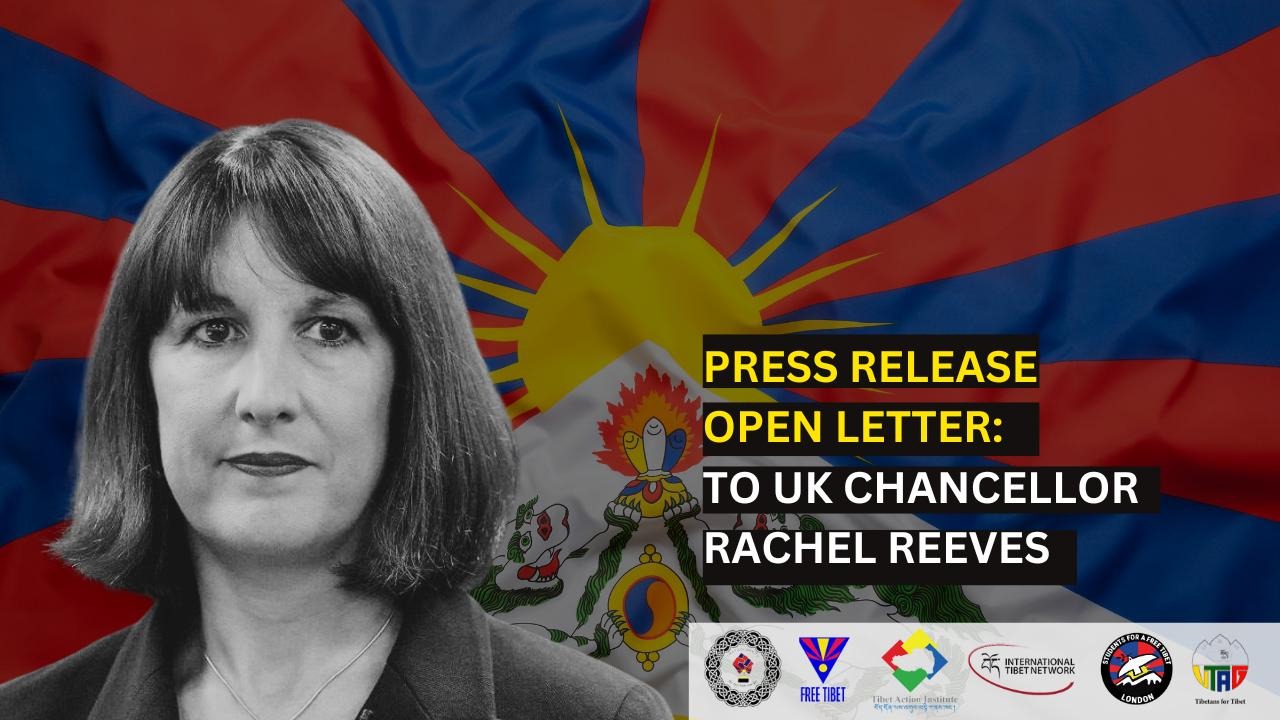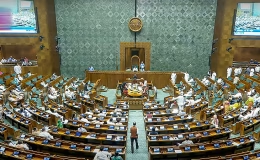UK Chancellor urged to challenge China on Tibet during her Visit
Rachel Reeves set to visit China to ”revive” UK-China economic talks
FOR IMMEDIATE RELEASE: 9 January 2025
[LONDON] Ahead of UK Chancellor of the Exchequer Rachel Reeves’ visit to China, UK-based Tibetans and Tibet groups called on Rachel Reeves to use her meetings with Chinese officials to press them on ending human rights abuses in Tibet and to “ensure that trade and access to Chinese markets do not take precedence over the rights of the Tibetan people.”In an open letter UK-based Tibetans and Tibet groups [1] expressed concern over China’s escalating control, unchecked mega development in Tibet, and policies that are “eradicating Tibetans’ traditional way of life” and that United Nations human rights experts have identified as possibly amounting to forced labour.[2]
Ms Reeves’ meeting is happening against a backdrop of serious rights abuses in occupied Tibet and as the Chinese government increases its systematic control via policies that have been criticised by international governments and United Nations human rights experts, including mass displacement and destruction of Tibetan heritage to make way for megadevelopment projects, and policies that “undermine Tibet’s religion, language and culture, and to monitor and politically indoctrinate Tibetans.”
Activists called Ms Reeves’ attention to the recent devastating earthquake in Tibet that has resulted in at least 126 deaths and thousands of homes being destroyed, warning that China’s restrictions on access and aid to Tibet will exacerbate the humanitarian crisis [3][4]. The open letter urged Ms Reeves to press Chinese leaders to lift these restrictions immediately, and allow the international community to provide access and assistance to those affected by the earthquake, without interference or obstruction from the Chinese government.
The activists also called on Reeves to ensure that “trade and access to Chinese markets do not take precedence over the rights of the Tibetan people.” This is an opportunity for the new Labour government to show that it can provide a credible, and necessary, challenge to the serious and unacceptable abuses in occupied Tibet and China’s attempts to undermine the international human rights system. This would send a clear signal to the Chinese leadership that the UK is prepared to speak up for human rights even as it negotiates the future trade relationship with China, setting a crucial precedent for other countries to follow.
John Jones of Free Tibet “The links between the UK and Tibet go back to before the People’s Republic of China was established, and should guide the relations between London and Beijing. As she discusses trade, Chancellor Reeves owes it to Tibetans to press for human rights improvements in Tibet, key among them should be calling for an end to the forced removals of Tibetans from their land and the labour transfer and vocational training programmes that are tearing the lives of Tibetan farmers and nomads apart.”
Tara Lhamo, Voluntary Tibetan Advocacy Group UK “As Chancellor Reeves prepares to meet with Chinese officials, we urge her to leverage the UK’s significant influence as a key trading partner to demand an end to China’s human rights abuses in Tibet. The UK must prioritise its core values and democratic principles over short-term economic gains. We call on the Chancellor to also meet with Tibet groups and community members upon her return. Anything less would be a betrayal of the UK’s commitment to human rights and democracy.”
Rashi Jauhri of International Tibet Network, “Trade and human rights do not have to be carried out in a vacuum, and Rachel Reeves must use her meetings in China to send a clear signal to the Chinese leadership that the UK is prepared to speak up for human rights even as it negotiates the future trade relationship. If not, the new Labour government risks returning to the failed Tory policies of the so-called “Golden Era” of the 2010s, when the human rights situation in Tibet sharply deteriorated. This is an opportunity for The Chancellor to show leadership on the world stage rather than placing the UK in isolation from international partners who are on high alert to the threats that Beijing’s policies pose in Tibet and beyond.”
Namgyal Samuels, Students For a Free Tibet, London “The UK government has a moral obligation to condemn China’s appalling human rights atrocities in Tibet and to unwaveringly support the Tibetan people’s right to self-determination. We urge Chancellor Reeves to take an unflinching stance against China’s human rights abuses in Tibet during her visit, and to refuse to sacrifice the UK’s values and principles for the sake of economic ties.”
“There is no business as usual with a regime that has forcibly separated one million Tibetan children from their families [to enforce loyalty to the State],” said Pema Yoko from Tibet Action Institute. “As a proud British Tibetan, I urge the Chancellor to uphold British values and ensure China is held accountable for its actions in Tibet, including the displacement of Tibetan people and destruction of Tibet’s land, people and unique culture.”
Eleanor Byrne-Rosengren, Tibet Solidarity “The UK has been a supportive partner of the People’s Republic of China since it recognised the establishment of the new state in 1950. The UK’s relationship with Tibet is centuries older and yet has often been used as a pawn in negotiations with the current Chinese regime. In her forthcoming meetings, Chancellor Reeves has an opportunity to reset both relationships and seek to achieve genuine balance between trade and human rights. We urge her not to waste this opportunity.“
The open letter stated that by challenging China’s human rights abuses in Tibet, the UK will set a crucial precedent for other countries to follow. The groups warned Chancellor Reeves that “absence of such steps will be tantamount to allowing those responsible for systematic human rights violations impunity.”
Contact:
John Jones, Free Tibet: john@freetibet.org +44 7591 188383
Rashi Jauhri, International Tibet Network: rashi@tibetnetwork.org +44 7587 094876
NOTES TO EDITORS:





Leave a Comment